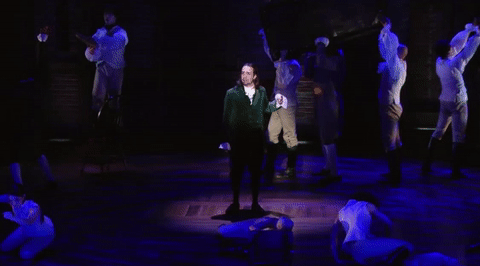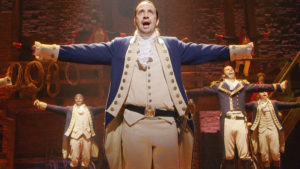This is my review of Hamiltony, part 2 of “Fulfilling My Hamiltonian Destiny.” Read part 1, detailing my winding path to seeing the musical at Rodgers Theater.
Hamilton is marvelous. It exceeded my fairly astronomical expectations. Writer and star Lin-Manual Miranda is a certifiable genius.
A significant portion of its charm derives from its central conceit: recontextualize the American Revolution with a cast of minorities using a hip hop idiom. The idea alone is charged and compelling: it draws a straight line between colonial British oppression and today’s racial tensions. It also provides a vibrant delivery of the familiar story of the forming of our nation; there’s something fun and subversive about listening to a dreadlocked black man rap about early American foreign policy as Thomas Jefferson. It illuminates the story as more modern, less stodgy than any passage in a history book could convey.
 It’s difficult to overstate how political, but not partisan, the play is: Its celebration of minorities, immigrants, and women, if a bit sanitized and idealized, is a reminder that freedom is only free if its fundamentally progressive. The more headlines there are about Black Lives Matter, immigration bans, and feminism, the more Hamilton feels like a unflattering mirror of our lost urgency for progress.
It’s difficult to overstate how political, but not partisan, the play is: Its celebration of minorities, immigrants, and women, if a bit sanitized and idealized, is a reminder that freedom is only free if its fundamentally progressive. The more headlines there are about Black Lives Matter, immigration bans, and feminism, the more Hamilton feels like a unflattering mirror of our lost urgency for progress.
I make the play sound heavy-handed, or at least heavy, but that couldn’t be less true. It’s fun as hell, richly dramatic and funny and clever and breakneck.
Miranda finds a complex protagonist in Alexander Hamilton. Miranda bends a few truths, but it always results in an improved narrative. It finds fascinating parallels and juxtapositions in dramatic details, recurring lines, and allusions. Perhaps the most profound of these developments is the play’s humanizing portrait of narrator Aaron Burr: where Ron Chernow’s biography amplifies Burr’s villainy, Miranda finds a sympathetic, tragic figure.
A literary playfulness pervades the libretto from beginning to end. Miranda muses on the “ten-dollar founding father without a father”; he crafts uncountable variations of rhymes on “Burr, sir”; he foreshadows Hamilton thrown duel shot with fun wordplay… and that’s just the first 3 of 46 numbers on the soundtrack! A few of my favorite motifs to listen for: various uses of counting up through ten, the falling musical line when naming “Alexander Hamilton” contrasted with the rising line used to name many others, and the evolving use of “talk less; smile more.”
The sense of invention and inverted expectations grows and grows: The use of King George as a stilted, crooning Greek chorus provides fantastic comic relief in addition to one of the musical’s catchiest “da-da-da” ditties. The depiction of cabinet debates as rap battles is astoundingly brilliant. And the empowerment given to the Schuyler sisters is a genius bit of historical incongruity (riffing on “all men are created equal,” Angelica vows to “compel [Jefferson] to include women in the sequel.”)
For me, the play’s most powerful and surprising theme is parenthood: Hamilton and Burr are noted early as orphans, and their duet on fatherhood, “Dear Theodosia,” is one of few songs in the world to reliably choke me up. (I’m about to become a father myself, so I might be predisposed.) Miranda tackles Philip Hamilton’s tragic death, and Hamilton’s grief, with astonishing dramatic power. The musical’s conclusion from the perspective of Eliza opening an orphanage is profound, if not the rousing finale I expected.
The play’s first act covers the Revolution and founding of the country, and the second act spans Hamilton’s postwar political life and death. While both are rich, I find the first act to be superior. Its plots are inherently more fun and dramatic. It leans more into the play’s hip hop conceit and captures a tone that’s dazzlingly optimistic. Among the musical’s most iconic moments and numbers, the large majority come before the intermission.
 That said, the second act does convey gravity with ease and cleverness: I particularly admire “Hurricane” as a moment of kaleidoscopic retrospect as Hamilton is shot. The infidelity stuff is handled fine, but is a downer that feels more tangential to the core of the play than it should.
That said, the second act does convey gravity with ease and cleverness: I particularly admire “Hurricane” as a moment of kaleidoscopic retrospect as Hamilton is shot. The infidelity stuff is handled fine, but is a downer that feels more tangential to the core of the play than it should.
Though the play makes remarkably coherent drama of historical fact, there are still a few holes left open: Hamilton’s unrequited romance with Angelica never really evolves beyond its compelling origin, and his fraternal bond with Lafayette, Hercules Mulligan (yes!), and John Laurens fizzles away without repercussion. It’s a slight damper, but not a showstopper.
I also love the first act because it builds another of the play’s major purposes: serving as a giant love letter to New York. From the Schuyler sisters admiring the urban chaos in their introduction, to Burr’s and Hamilton’s account of their postwar hustle and bustle in “Non-Stop,” to Eliza’s testament to peaceful uptown Manhattan, and more, the Big Apple is as much of a main character as any of the principles. Like nearly every modern depiction, Miranda’s colonial New York is a cosmopolitan place of possibility.
As we approach the nation’s 141st birthday, I also want to praise Hamilton‘s patriotism. When I talked with my Manhattan residing friend Katie Lucas about the play, she noted: “it really restored my faith in America.” The play is a reminder that we should be proud of, and take ownership of, our homeland, and that all it takes is a little bit of “non-stop” creativity and energy and youthfulness for our nation to be relevant.
 My biggest regret about the play is that I didn’t see it when Miranda was in the lead role: It’s such a personal and strong-voiced character that I feel I missed a special opportunity to see the man who wrote it and envisioned himself in the central role. Miranda’s 2009 performance of the opener at the White House Poetry Jam was one of the main catalysts in my interest in Hamilton the founding father, and it would have been a piece of poetic closure to see Miranda perform it on Broadway. Alas; the entire cast was fantastic, and Jevon McFerrin was incredible as our titular tomcat.
My biggest regret about the play is that I didn’t see it when Miranda was in the lead role: It’s such a personal and strong-voiced character that I feel I missed a special opportunity to see the man who wrote it and envisioned himself in the central role. Miranda’s 2009 performance of the opener at the White House Poetry Jam was one of the main catalysts in my interest in Hamilton the founding father, and it would have been a piece of poetic closure to see Miranda perform it on Broadway. Alas; the entire cast was fantastic, and Jevon McFerrin was incredible as our titular tomcat.
Great music, great writing, great performance… Hamilton is entertaining and profound and thoughtful, one of few cultural zeitgeists that manages to live up to the hurricane of hype.
And since I’m on the topic, and a relentless list-maker, there’s only one way I can end this article… a selection of ten of my favorite moments in the play. I opted for chronological order because there was no way I was going to rank these.
- The entirety of the opener, but particularly the contrapuntal climax of the chorus singing “In New York you can be a new man!” as Hamilton repeats “just you wait…”
- The chorus of “My Shot.” While I love the one beat pause in the repeated line “I am not throwing away my… shot,” you can’t top the line “Just like my country, I’m young, scrappy, and hungry” for percussive grace.
- King George’s overdramatic crooning is hilarious and charming every time it’s used, but you can’t top the impact of his first appearance, “You’ll Be Back,” especially as George devolves into hysterical threats: “When push comes to shove, I will send a fully-armed battalion to remind you of my love.”
- Lafayette’s scorching, rapidfire first verse in “Guns and Ships.” It’s the most astonishing bit of actual rap in the book, one that I hope to memorize myself.
- “Immigrants: We get the job done” from “Yorktown” should not have to be a political statement. And yet it is. This line garnered some of the biggest cheers of the showing I was at.
- When we first meet Philip Hamilton in “Dear Theodosia,” Hamilton half-whispers “Philip, when you smile, I am undone, my son” in a way that makes me emotional every time.
- Philip’s simple rap and Alexander’s enthusiastic response in “Take a Break” are adorable.
- The cabinet battles are perfection from front to end, funny and charged, but my favorite moment is when Hamilton ponders what (a beheaded) King Louie would suggest to Americans: “Do whatever you want; I’m super dead.”
- The seamless transition from Hamilton writing to Washington’s delivery of the farewell address of 1796 in “One Last Time.”
- The closing number, which brings the question of “who lives, who dies, who tells your story?” full circle. Eliza founds the orphanage and ensures that “time” will properly tell her husband’s story.
All that, and I didn’t make room for anything from “The Schuyler Sisters” or “Wait for It.” This soundtrack is a masterpiece.






